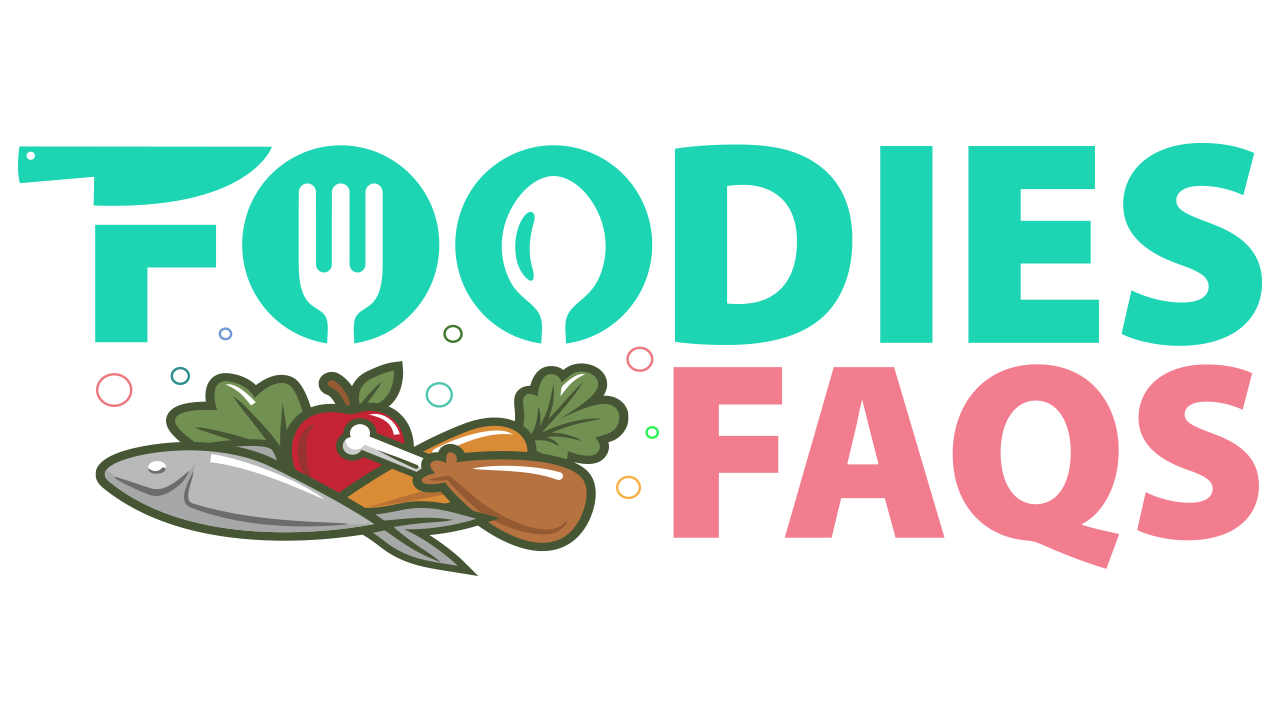Mornings can be the best with cozy breakfasts. I love starting a day with roasted butternut squash soup. This warming breakfast is too good to make your day.
I had to do so because I was overweight then and was determined to lose weight a couple of years ago. Ever since I started doing keto, I researched everything literally before eating a food. I search google about the calories, nutritional values, and most importantly, whether it is keto friendly or not.
I used to feel weak and dizzy all day long. I was desperate to lose weight fast and cut down all carbs from my daily meal. I lost 10 kgs, but my health was damaged a lot.
Besides that, I was facing a severe hair fall. Later on, my doctor suggested I shift to the keto diet. I have been following keto since then and got so many benefits.
Is butternut squash keto friendly? As butternut squash is one of my favorites. I was afraid if I should avoid it on keto or not. With my little knowledge, I will describe it straightforwardly.
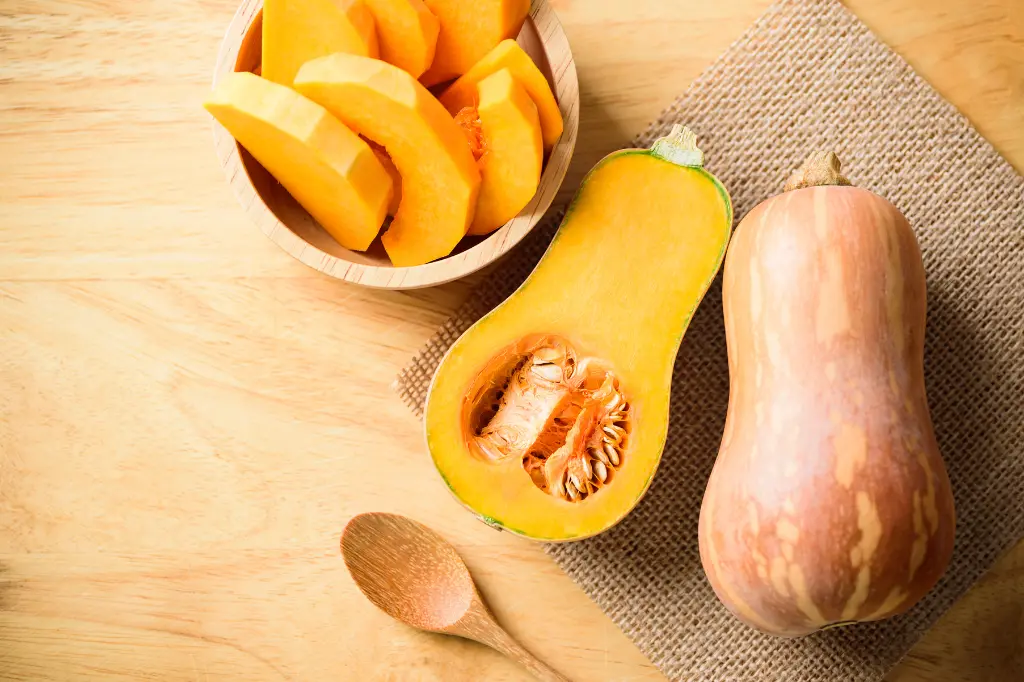
Table of Contents
Butternut Squash Keto Or Not?
Keto limits the carbohydrate intake of keto dieters. It should be less than 20-50 grams a day. Vegetables can be classified in two ways: Above-ground vegetables and below-ground vegetables.
Above-ground vegetables generally contain low carbs. On the other hand, below-ground vegetables are high in carbs. In that sense, above-ground vegetables sound to be more keto friendly.
Butternut squash growing beside the house is easy. This plant often grows on a vine. The butternut squash season is at the end of May or at the beginning of June.
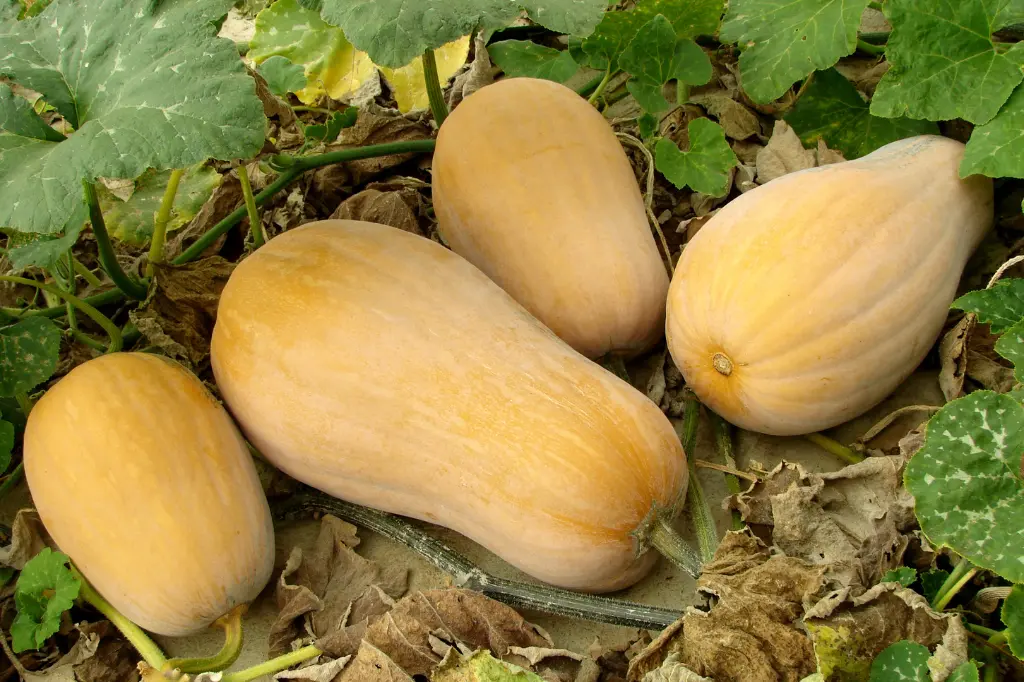
Sometimes it can grow on trellises if the space is less. It is pear-shaped. My friend once planted butternut squash in a pot, and surprisingly, it was produced.
So, we have concluded that butternut squash is an above-ground vegetable. We need a lot more information to clarify- is butternut squash keto friendly?
Nutrition Facts Of Butternut Squash
100 grams of butternut squash contains:
- Calories: 40
- Total carbohydrates: 10 grams
- Fiber: 3.2 grams
- Total fat: 0.1 gram
- Protein: 0.9 gram
- Sodium: 4 milligram
- Potassium: 284 milligram
- Iron: 1.4 milligram
- Net carbs: 6.8 grams
A Deep Brief Of Butternut Squash Nutrients
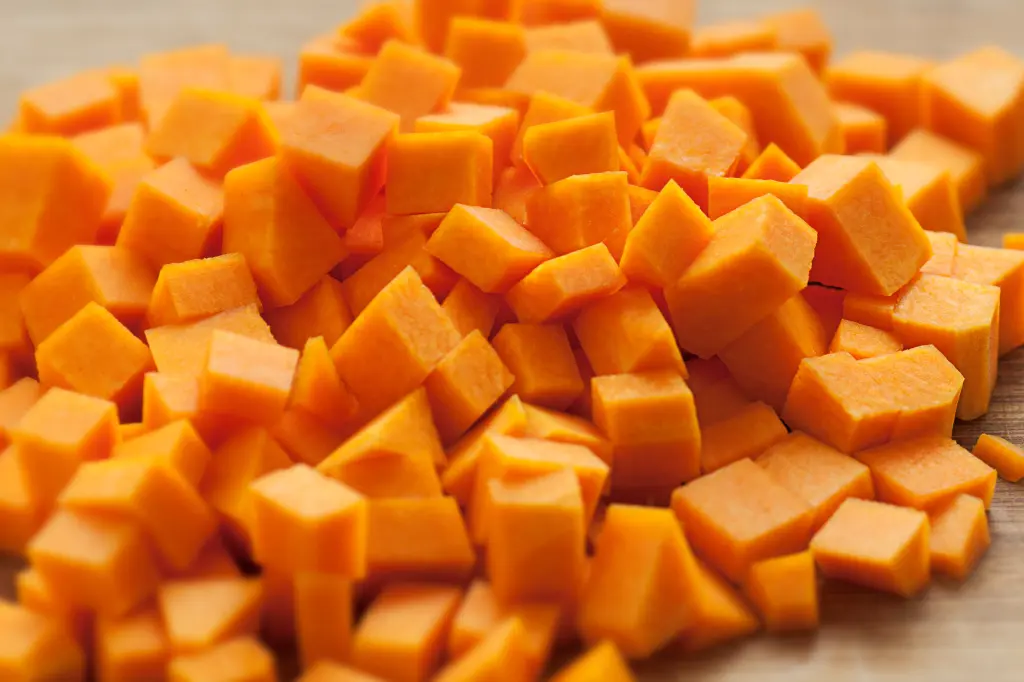
Low Calories
In Australia or New Zealand, butternut squash is also called gramma or butternut pumpkin. It is mainly compared with pumpkin for the sweet and nutty flavor. It almost tastes similar to pumpkin.
Keto maintainers enjoy recipes made with pumpkin for the low calories. An interesting fact is that butternut squash also contains low calories.
Rich In Fiber
You may think butternut squash is low in calories, so it must be less in nutrients. That is going to be a misconception. According to the nutritional values of butternut squash, it is high in fiber.
The popularity of the keto diet is beyond description. But one of the side effects is keto constipation. Due to keto constipation, your stool may get complicated and lumpy.
Usually, our body burns carbohydrates (glucose) for energy during a diet. But keto is different. The body burns fat while on a keto diet.
Mostly, people tend to poop less during the keto diet. It should be at least once a day or more than that. Also, the stool becomes difficult to pass out.
What is the reason for keto constipation? Well, it happens because of eating less fibrous foods. Fiber or dietary fiber is this much important in keto.
Butternut squash contains high fiber. Nutritionists suggest an intake of 21-25 grams of fiber a day for women and 30-38 grams for men.
High In Potassium
Potassium is called one of the essential minerals for your body. It helps the cells of your body to function correctly. Less potassium can cause severe diseases, whereas too much potassium can cause kidney failure.
Butternut squash is one of the vegetables containing high potassium. As we know, high potassium makes stronger bones. Potassium foods are effective for both younger and older women who risk osteoporosis.
The level of potassium is slightly different between cooked and raw butternut squash.
Other Vital Nutrients
Butternut squash is a perfect vegetable for the fall season as it is harvested in this season. It is entirely healthy to eat raw butternut squash. There are no harmful or toxic elements or leaves in the raw form of butternut squash.
It is often used in smoothies or salads. You can eat or use it in any dish with the skin. Even you need not peel off the skin of butternut squash.
Though people mostly like to eat roasted or cooked butternut squash. I also like the roasted ones. Whenever I hurry to cook anything fancy, I make roasted butternut squash for lunch or dinner.
All you have to do is toss cubed butternut squash pieces in extra virgin olive oil. Add some minced garlic to it too. At last, you have to season it with salt and black pepper according to your taste.
Butternut squash is rich in vitamins A and C. Everyone knows the benefits of the two vitamins. Vitamin A helps prevent night blindness.
This vitamin is the most beneficial one for a healthy vision. It also boosts the immune system and develops the body’s cell growth. Vitamin A is essential for fetal development as well.
Vitamin C is a kind of vitamin that your body can not produce. Yet you need this vitamin badly for many aspects. As per the doctor’s recommendations, a woman should intake 75 milligrams of vitamin C and men should intake 90 milligrams daily.
It is one of the most potent antioxidants. Vitamin C helps to maintain healthy skin, nails, and hair. In covid times, doctors emphasized the matter of intaking a lot of vitamin C every day.
One hundred grams of butternut squash contain 21 milligrams of vitamin C and 10,630 IU of vitamin A. So, we can say that butternut squash is packed with essential vitamins.
Dehydration problems are common during cold months or winter. Butternut squash works excellent as a natural hydrator. It has 87% water per serving that keeps you hydrated in winter.
Commonly, fruits or vegetables that are orange in color are full of beta carotenes. Butternut squash is not different from that. We have previously said about vitamin A, so you must know that beta carotene converts into vitamin A in your body.
Let me share another astounding fact now. One cup (around 205 grams) of butternut squash contains 59.4 milligrams of magnesium. Magnesium is crucial to fight against depression, and migraine, prevent heart diseases, etc.
Opposing Sides Of Butternut Squash
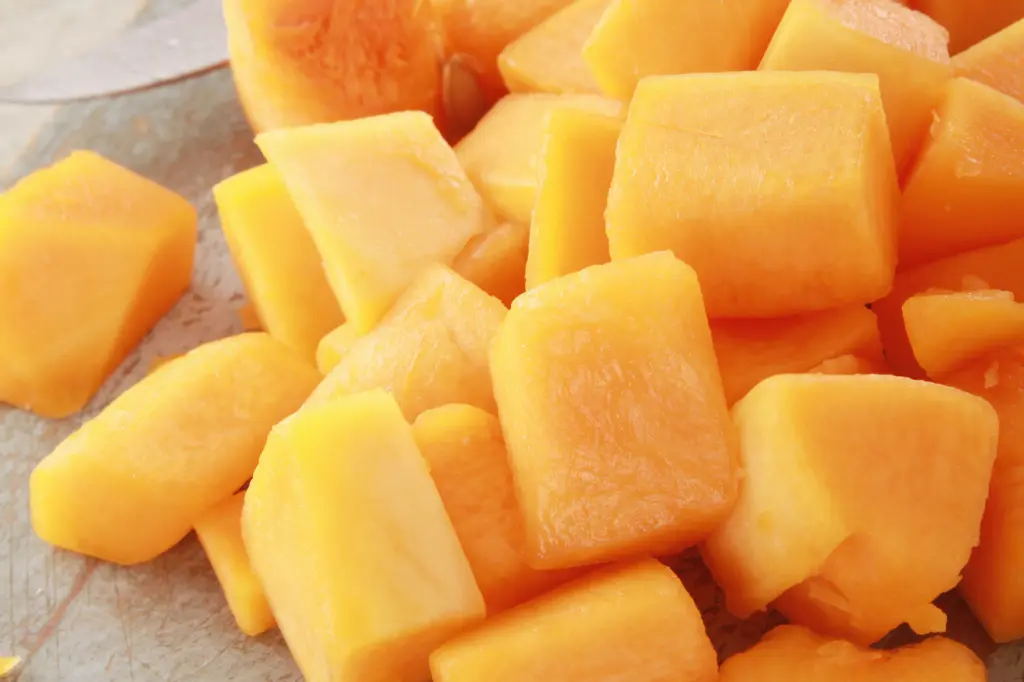
The first negative side of butternut squash is low in fat. You are not allowed to eat a lot of carbs in keto. So the energy in the body should come from none other than fat.
Fat makes you feel fuller during ketosis. Dieters who do workouts especially need energy in the body. Fat provides the energy, or you can say it is ultimately the fuel for your body at that time.
But that does not mean dieters can have any fat on keto. Artificial trans fats, fats from processed foods like chips, canned fish, etc., should be avoided during a ketosis diet. Consult with a certified nutritionist to know the right fat for you.
Another fact is butternut squash does not contain as much protein as needed in a keto. One cup of cooked butternut squash contains only 1.8 grams of protein. Although the keto diet requires high fat, not high protein, the importance of protein for the body can never be neglected.
Is Butternut Squash Fit For Keto?
So, what do you think? Is butternut squash keto friendly? From the above nutritional discussion, we found that butternut squash is low in calories and contains only 6.8 grams of net carbs per 100 grams of serving size.
If you are on a strict keto diet then you should avoid butternut squash, because it’s not strictly keto friendly. But if you are not on a strict keto diet or following the low-carb diet then butternut squash is considered keto friendly and you can include it into your diet chart but in moderation.

Benefits Of Butternut Squash
I was amazed when I learned about the many benefits of butternut squash. This delicious vegetable is the ultimate win for vegan people. A few benefits of butternut squash are:
Helps In Weight Loss
Butternut squash can be your best friend during your weight loss journey. As I already said it contains very low calories. Butternut squash’s nutty and sweet taste may appeal to you but will indeed manage your appetite after eating.
Helps To Reduce Inflammation
Butternut squash is full of vital antioxidants. It prevents the risk of inflammatory diseases such as rheumatoid arthritis.
Helps To Prevent Measles
Measles is a contagious disease. It happens because of the measles virus. This infectious disorder is not common in the United States nowadays.
Lack of vitamin A is responsible for this disease. Butternut squash is rich in vitamin A, and thus, it helps prevent measles. But it still can be the reason for death in a few developing countries.
Fights Against Cancer
Some reports show that intake of foods high in vitamin A may reduce the risk of prostate cancer. It also significantly helps to lower the risk of lung cancer.
Reduce Blood Sugar
Butternut squash is an excellent source of dietary fiber. Fiber not only helps to improve blood sugar but also reduces the risk of type 2 diabetes. Moreover, it has a glycemic index that works to digest slowly.
Side Effects Of Butternut Squash
Butternut squash is a healthy option for your regular meal. But it should be eaten in moderation. The high amount of potassium in it may cause digestive problems.

Heart patients, especially those prescribed beta-blockers should be careful before eating high potassium foods. It may hamper their health rather than improve. Kidney patients are also at risk and should avoid eating butternut squash too much.
Eating butternut squash excessively can also cause diarrhea and stomach irritation. So, a little is always okay.
Frequently Asked Questions
1. Can I have butternut squash soup on keto?
Yes, you can have it in moderate amounts. Let me share a quick keto friendly butternut squash soup recipe with you. You will need butternut squash, chicken broth, sour cream, steamed cauliflower, and salt according to the taste.
The best thing is that you can easily make it in an instant pot. Just add your cubed butternut squash in chicken broth. After that, turn on your pressure cooker and cook for 15 minutes.
Your mouth-watering butternut squash soup is ready to enjoy. Add steamed cauliflower after the soup is cooked and keep it aside to cool down. At last, mix well in a blender, and add sour cream and some salt.
2. Is butternut squash high in carbs?
Butternut squash is low in carbs. 100 grams of butternut squash contains 10 grams of total carbohydrates and 6.8 grams of net carbs. It can be fine to eat on a keto diet or other low-carb diet but in moderation.
3. Can I have an allergy to eating butternut squash?
Well, butternut squash does not create any allergic issues in general. But few reports have been found that butternut squash may cause dermatitis.
It happens on the hands when people peel and cut down the squashes. So, it is better to wear gloves for safety.
4. Does butternut squash contain calcium?
Butternut squash is also a fantastic source of calcium. One hundred grams of butternut squash contain 48 milligrams of calcium.
5. Is butternut squash helpful for asthma?
Butternut squash has beta-carotene, which can reduce the risk of asthma. Fruits or vegetables high in beta-carotene can be identified by their orange pigment.
6. What can I serve with roasted butternut squash?
Roasted butternut squash can be a fantastic keto friendly side dish. You can serve grilled steak, oven-baked chicken drumsticks, etc. But make sure whatever you do should not be deep-fried.
7. Can I eat butternut squash during pregnancy?
Iron foods are effective in pregnancy as this vital mineral works great for fetus development. It also lowers the risk of anaemia. Butternut squash is a good source of iron, and thus, it is fruitful for pregnant women.
8. Can I also eat butternut squash seeds?
Of course, you can eat. Just as you can eat pumpkin seeds, butternut squash seeds are edible. It can make a great nutritional snack item for you.
Final Thoughts
Butternut squash can be easily called a versatile vegetable as it can be vastly used in many culinary works. Moreover, it goes well with not only sweet but also savory dishes. People enjoy it in both ways.
If we talk about botany, we will notice that all the squashes are fruits. But there is a controversy about butternut squash. Is butternut squash a fruit or a vegetable?
All kinds of squash have seeds, and we know fruits come from the flowers of a plant. So, we can consider butternut squash as a fruit by botanical theory. But not everyone can agree with botany.
Butternut squash looks like fruit for its bright color but tastes like a vegetable. Though squashes can be eaten raw, people mostly enjoy them when they are cooked. I like the simple roasted butternut squash, and sometimes some cinnamon in it increases the taste.
Pumpkins also belong to the squash family. Keto dieters already know, but still, I am saying that pumpkin fits well in low-carb diets. But dieters still fall in a dilemma when it is to butternut squash.
Is butternut squash keto Friendly? If you limit the intake of your portions, then butternut squash will fit into the ketosis. But I must alert you that it is not the most keto friendly veggie option of yours.
